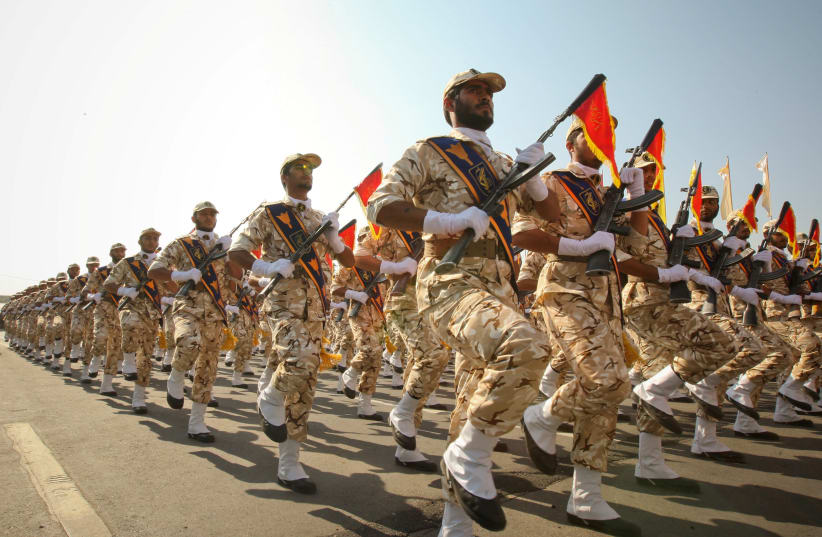Iran is on course to breach a threshold in its nuclear agreement within days by accumulating more enriched uranium than permitted, although it had not done so yet by a deadline it set for Thursday, diplomats said, citing U.N. inspectors' data.
A week after US President Donald Trump called off air strikes on Iran minutes before impact, the prospect that Tehran could soon breach its nuclear commitments has created additional diplomatic urgency to find a way out of the crisis.
Iran had set Thursday as a deadline beyond which it would exceed the threshold for stockpiles of enriched uranium allowed under its 2015 nuclear deal with world powers, which is still in force although Washington abandoned it last year.
The latest data from U.N. inspectors suggested Iran had not yet crossed the limit but was on course to do so within days, diplomats said in Vienna, headquarters of the U.N. nuclear agency IAEA.
"They haven't reached the limit... It's more likely to be at the weekend if they do it," said one diplomat, on condition of anonymity.
The US envoy on Iran, Brian Hook, met European officials in Paris on Thursday to discuss what he described as Iran's "nuclear blackmail".
France, one of the European countries caught in the middle, said it would ask Trump to suspend some sanctions on Iran to make room for negotiations to defuse the escalating confrontation between Washington and Tehran.
"I want to convince Trump that it is in his interest to re-open a negotiation process (and) go back on certain sanctions to give negotiations a chance," French President Emmanuel Macron said in Japan, where he is due to meet Trump on the sidelines of a summit in coming days.
The United States withdrew from the pact last year under which Iran accepted curbs on its nuclear programme in return for access to international trade. Iran has said it wants to abide by the agreement but cannot do so indefinitely as new US sanctions mean it is receiving none of the benefits.
The escalating crisis has put the United States in the position of demanding its European allies enforce Iranian compliance with an accord Washington itself rejects.
"Our sanctions do not give Iran the right to accelerate its nuclear programme," U.S. envoy Hook said in an interview before his talks with European officials. "It can never get near a nuclear bomb. We are looking very closely at that so it doesn't get below the one year nuclear breakout time."
Macron said he had two priorities: de-escalating military tension and keeping Iran from violating the accord, which European countries still hope to save even though Trump ignored their pleas and quit it last year.
"OBLITERATION"
The confrontation, brewing for a year after Trump quit the pact, accelerated last month when the United States sharply tightened its sanctions, ordering all countries to halt purchases of Iranian oil, Iran's main source of income.
Trump's aborted air strikes last week were the culmination of weeks of heightened military tension. Washington accused Iran of being behind attacks on ships in the Gulf, which it denies.
Last week Iran shot down a US drone it said was in its air space. The United States said it was in international skies.
Since the aborted air strikes last week there have been no major incidents, but rhetoric on both sides has become menacing.
This week Trump threatened Iran's "obliteration" if it attacked US interests while Rouhani, typically the mild-mannered face of the Tehran government, called White House policy "mentally retarded".
Trump later said he hoped to avoid war, but that if one took place it would be short and not involve boots on the ground. Iran's Foreign Minister Mohammad Javad Zarif tweeted in response on Thursday that a "short war with Iran is an illusion", and the threat to obliterate Iran amounted to a threat of genocide.
Acting U.S. Defense Secretary Mark Esper, seeking support from NATO allies in Brussels, said: "We do not seek armed conflict with Iran but we are ready to defend U.S. forces and interests in the region."
The Trump administration says its ultimate goal is to force Iran back to the table for negotiations. It argues that the 2015 deal, negotiated under Trump's predecessor Barack Obama, was too weak because it is not permanent and does not cover non-nuclear issues, such as Iran's missile programme and regional behavior.
Iran says it cannot negotiate further unless the United States observes the existing agreement and lifts sanctions.
Tehran says Washington would be to blame if it ends up breaching the limit on uranium stockpiles, since the deal allows it to sell excess uranium abroad to reduce its holdings, but U.S. sanctions have prevented this. It has set a separate deadline of July 7 when it could breach another major threshold, on the level of purity of uranium it has enriched.
The consequences of any Iranian violation would be difficult to predict. Breaches could be reversed by shipping material out of Iran or blending it with uranium that has not been enriched.
"If the Iranians exceed the limit, for the Europeans it will not be game over, it will be game on," said Jon Alterman, director of the Middle East Program at the Center for Strategic and International Studies think tank in Washington. "The Europeans will see this as a discrete task to try to reverse."
